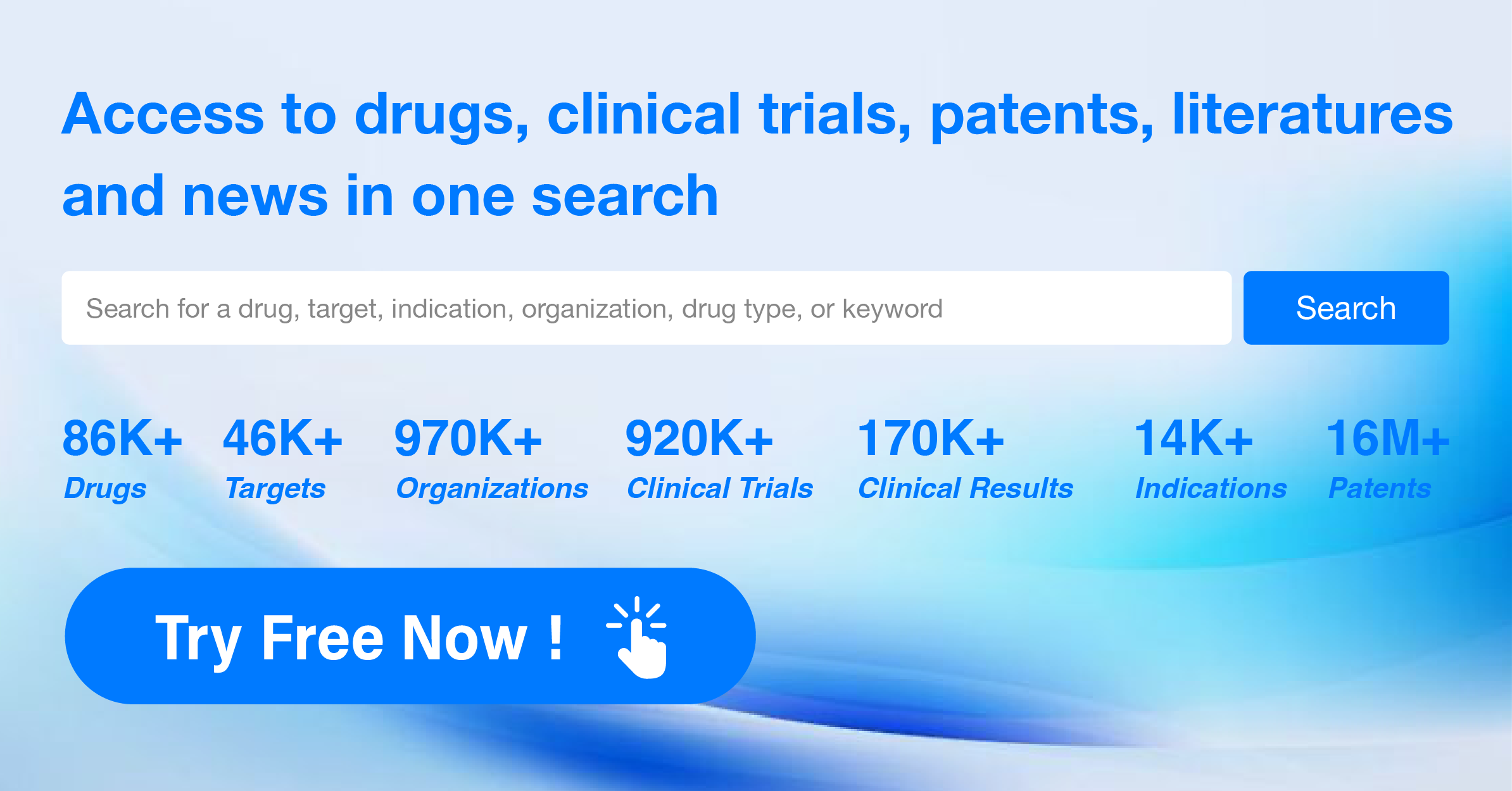Global New Drug Research and Development Progress Weekly Report(6.10-6.16)
Global Pharmaceutical Research and Development Progress
1.AstraZeneca's third-generation EGFR inhibitor, osimertinib (Tagrisso), files for new lung cancer indication in the US
On June 10th, AstraZeneca announced that the FDA has accepted and granted priority review to the supplemental New Drug Application (sNDA) for Tagrisso for the treatment of patients with unresectable EGFR-mutated (exon 19 deletion or exon 21 (L858R) mutation) stage III non-small cell lung cancer (NSCLC) following chemoradiation therapy (CRT). The FDA is expected to make a decision on approval in the fourth quarter of this year. The sNDA submission is based on the positive results from the phase III LAURA study. The results demonstrated that patients treated with osimertinib had a significant extension in progression-free survival (PFS) compared to the placebo group (39.1 vs. 5.6 months, HR=0.16, P<0.001); at 12 months, 74% of the osimertinib group were alive and disease-free, compared to 22% in the placebo group; at 36 months, 84% of the osimertinib group and 74% of the placebo group were alive (HR=0.81, P=0.53, data maturity at 20%). In terms of safety, the incidence of grade 3 or higher adverse events was 35% in the osimertinib group versus 12% in the placebo group. Additionally, 48% of the patients in the osimertinib group reported radiation pneumonitis (primarily grades 1-2), compared to 38% in the placebo group. No new safety issues were identified.
2.Eisai/Biogen Initiates BLA Submission for Subcutaneous Injection Therapy for Alzheimer’s Disease
On June 11, Eisai and Biogen announced the commencement of the rolling submission to the FDA for a Biologics License Application (BLA) of the subcutaneous injection form of Leqembi for Alzheimer’s disease therapy, intended for weekly administration as a maintenance treatment in patients with mild cognitive impairment or mild dementia stages of the disease. Concurrently, the FDA has accepted the supplemental Biologics License Application (sBLA) for a monthly intravenous injection of Leqembi as a maintenance therapy for the same patient group. The FDA is expected to complete its review of this sBLA by early next year. As part of the maintenance treatment, patients who have completed the bi-weekly initiation phase of Leqembi treatment will receive a monthly intravenous infusion of Leqembi to maintain effective drug concentrations and continue the clearance of highly toxic amyloid fibrils. Data from studies 201, 301, and their open-label extension studies suggest that continuing treatment with Leqembi after an 18-month core treatment phase can prolong its benefits. If the sBLA is approved, the monthly dosing regimen could maintain clinical and biomarker benefits with less burden, making it easier for patients and their caregiving partners to adhere to the treatment over the long term. Moreover, the subcutaneous injection form of Leqembi uses an autoinjector, providing convenience for administration by patients and caregivers.
3.Regeneron's/Sanofi's humanized monoclonal antibody drug Kevzara gains another FDA approval!
On June 12, Regeneron Pharmaceuticals announced that the US FDA has approved Kevzara (sarilumab), developed jointly with Sanofi, for the treatment of patients with active polyarticular juvenile idiopathic arthritis (pJIA) who weigh 63 kilograms or more. This condition is a type of arthritis that affects multiple joints. Symptoms of pJia may include joint pain, stiffness, and swelling, which can limit their activities and make it difficult for them to perform certain daily tasks. The FDA's approval for the treatment of the pJIA patient group was based on robust and well-controlled trial results, pharmacokinetic data from adult patients with rheumatoid arthritis, and pharmacokinetic, pharmacodynamic, dose exploration, and safety studies in pediatric pJIA patients. No new adverse reactions or safety issues were found in pJIA patients compared to those with rheumatoid arthritis. The most common drug-related adverse reactions in pJIA patients include nasopharyngitis, neutropenia, upper respiratory infections, and injection site erythema.
4.Kyowa Kirin's New Calcimimetic Agent Evocalcet Receives Approval for Marketing Authorization
On June 12th, the latest announcement on the official website of the China National Medical Products Administration (NMPA) confirmed that the new drug marketing application for Evocalcet tablets, a class 5.1 new drug submitted by Kyowa Kirin, has been officially approved. According to publicly available information from Kyowa Kirin, Evocalcet is a novel calcimimetic agent. It has been approved in China for the treatment of secondary hyperparathyroidism (SHPT), a significant manifestation of mineral metabolism disorder and a common, severe complication in patients with chronic kidney disease (CKD).
Calcimimetics are allosteric agonists of the calcium-sensing receptor (CaSR) that enhance the sensitivity of CaSR to calcium ions, directly inhibiting the secretion of parathyroid hormone (PTH) and the proliferation of parathyroid cells. According to Kyowa Kirin's public data, Evocalcet was originally discovered by Mitsubishi Tanabe Pharma Corporation. In 2008, Kyowa Kirin obtained the rights to collaborate on research, development, commercialization, and production of Evocalcet in Japan and certain regions of Asia through a licensing agreement.
As a second-generation derivative of Cinacalcet (a previously approved calcimimetic agent), Evocalcet not only effectively lowers parathyroid hormone, calcium levels, and fibroblast growth factor 23 (FGF23) but also reduces phosphorous levels by inhibiting bone resorption. Additionally, it shows marked improvements in bioavailability and significantly reduces gastrointestinal side effects and drug-drug interactions.
5.Lilly's New Diabetes Drug, Glucagon Nasal Powder Spray, Approved in China for Severe Hypoglycemia Treatment
On June 12, the latest public information on the official website of the National Medical Products Administration (NMPA) of China indicated that the marketing application for the new drug Glucagon Nasal Powder Spray, submitted by Eli Lilly and Company, has been approved. According to an earlier press release from Lilly, this medication, commercially known as Baqsimi, is a glucagon nasal powder spray administered via nasal delivery. The newly approved indication is for the treatment of severe hypoglycemia in diabetes patients aged 4 years and older.
Studies show that hypoglycemia lasting for 30 minutes can result in irreversible brain damage. Individuals experiencing severe hypoglycemia typically require glucagon injections, which involve complex procedures such as reconstitution, degassing, and specialized injection techniques. These procedures do not meet the immediate emergency needs for severe hypoglycemia. Baqsimi, a glucagon nasal powder spray, provides a nasal delivery method. According to previously published information from Lilly, it uses a single-dose dispenser that stimulates the liver to release stored glucose into the bloodstream, thereby increasing the patient's blood sugar levels.
6.Novartis Announces Approval of New Indication for JAK Inhibitor Ruxolitinib Phosphate in China
On June 13, Novartis announced that its JAK inhibitor, Ruxolitinib Phosphate tablets, had received approval from the China National Medical Products Administration (NMPA) for a new indication: the treatment of chronic graft-versus-host disease (cGVHD) in patients aged 12 and older who have inadequate responses to corticosteroids or other systemic therapies. Previously, in 2023, Ruxolitinib was approved by the NMPA for the treatment of acute GVHD (aGVHD) in patients aged 12 and older who had inadequate responses to corticosteroids or other systemic therapies. Furthermore, it was approved in China in 2017 for adult patients with intermediate- or high-risk primary myelofibrosis (PMF), post-polycythemia vera myelofibrosis (PPV-MF), or post-essential thrombocythemia myelofibrosis (PET-MF) to treat disease-associated splenomegaly or related symptoms. Hematopoietic stem cell transplantation offers a new lease on life for many patients with hematologic diseases; however, 30% to 70% of patients who undergo allogeneic hematopoietic stem cell transplantation face the threat of cGVHD. Corticosteroids remain the frontline treatment for cGVHD, but their effectiveness rate is only 50% to 60%, with some patients progressing to steroid-refractory cGVHD (SR-cGVHD). These patients have poor prognoses, and long-term use of corticosteroids can lead to adverse effects such as infections and osteoporosis, increasing the risk of poor outcomes. There is still a significant unmet medical need for patients with SR-cGVHD. The mechanism of cGVHD is complex, with the primary pathophysiological process being immune-inflammatory reactions, commonly manifesting as fibrosis. The Janus kinase 1 and 2 (JAK1-JAK2) signaling pathway plays a critical role in the steps leading to inflammation and tissue damage. Ruxolitinib, a JAK1/2 inhibitor, can reduce the incidence of cGVHD by inhibiting donor T-cell proliferation, the production of inflammatory cytokines, and the function and activity of Tregs. Additionally, preclinical studies on systemic sclerosis indicate that Ruxolitinib can prevent or ameliorate skin and lung fibrosis, demonstrating anti-fibrotic properties.
7.Bristol Myers Squibb's repotrectinib has received FDA accelerated approval, with Zai Lab holding the rights in China
On June 14th, Bristol Myers Squibb announced that the U.S. FDA has granted accelerated approval to its oral tyrosine kinase inhibitor (TKI), Augtyro (repotrectinib), for the treatment of adult and pediatric patients aged 12 and older with locally advanced, metastatic, or surgically unresectable solid tumors that are likely to result in severe morbublic outcomes. These patients must have tumors positive for neurotrophic tyrosine receptor kinase (NTRK) gene fusions, and have either progressed following prior treatment or have no satisfactory alternative therapy options. In China, Zai Lab holds exclusive licensing rights to develop and commercialize repotrectinib in the Greater China region. Repotrectinib has previously been approved in China for treating adult patients with locally advanced or metastatic non-small cell lung cancer that is ROS1-positive. The approval was primarily based on the results from the TRIDENT-1 trial. TRIDENT-1 is a global, multicenter, single-arm, open-label, multi-cohort phase 1/2 clinical trial designed to evaluate the safety, tolerability, pharmacokinetics, and antitumor activity of Augtyro in patients with locally advanced or metastatic solid tumors positive for NTRK gene fusions (NTRK1/2/3).
8.The clinical data for IN8bio's INB-100, a gamma delta T cell therapy, is impressive, with 100% of patients achieving complete disappearance of tumor cells and maintaining this for one year!
On June 14th, IN8bio presented the latest Phase 1 clinical trial results of its proprietary gamma delta T cell therapy, INB-100, at the 2024 European Hematology Association (EHA) Annual Meeting. The results demonstrated that 100% of evaluable leukemia patients (n=10) maintained complete remission (CR) one year after treatment. The data also indicated sustained in vivo expansion of allogeneic gamma delta T cells lasting 365 days post a single treatment. The press release highlighted this as the first instance of persistent expansion and durability demonstrated by an allogeneic cell therapy. INB-100, derived from healthy donors, involves ex vivo expansion and activation of allogeneic gamma delta T cells before infusion into leukemia patients. In this investigator-initiated Phase 1 clinical trial, leukemia patients received a dose of INB-100 following hematopoietic stem cell transplantation. The trial included patients at high risk and those with relapsed acute myeloid leukemia (AML) who had previously undergone multiple treatments, including CAR-T cell therapy. As of May 31, 2024, 100% of the evaluation-ready leukemia patients were alive and continued to maintain complete remission for one year. Historical data published previously indicates that up to 50% of blood cancer patients experience relapse following hematopoietic stem cell transplantation with reduced intensity conditioning, often leading to death shortly after relapse.
9.Innovative antibody therapy Setrusumab yields positive Phase 2 clinical results with zero fracture incidence!
Ultragenyx Pharmaceutical and Mereo BioPharma have announced that their investigational therapy, setrusumab, in the Phase 2 segment of the Phase 2/3 ORBIT trial, continues to significantly reduce the fracture incidence in patients with osteogenesis imperfecta (OI) after at least 14 months of follow-up. The median annualized fracture rate reached 0. Concurrently, treatment with setrusumab also significantly and consistently increased lumbar bone mineral density (BMD) by the 12th month. Data revealed that over the two years prior to receiving setrusumab treatment, all 24 patients had a median annualized radiologically confirmed fracture rate of 0.72. After an average of 16 months of treatment, the median annualized fracture rate decreased to 0.00 (p=0.0014; n=24). The annualized fracture rate does not include morphological vertebral fractures and fractures of the fingers, toes, skull, and face, aligning with the primary efficacy endpoint of the Phase 3 study. The reduction in the annualized fracture rate corresponds with the continued increase in BMD. At the 12-month evaluation, setrusumab treatment facilitated an average increase of 22% from baseline in lumbar spine BMD across all age groups (p<0.0001, n=19), which showed further improvement from a 14% increase observed after six months of treatment.
For more information on the progress of drug development, please follow the Synapse database.




